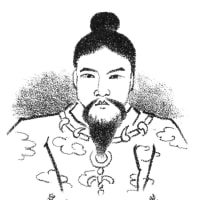『古事記』古事記上卷 幷序 5 ≪改訂版≫
伏惟、皇帝陛下、得一光宅、通三亭育、御紫宸而德被馬蹄之所極、坐玄扈而化照船頭之所逮、日浮重暉、雲散非烟、連柯幷穗之瑞、史不絶書、列烽重譯之貢、府無空月。可謂名高文命、德冠天乙矣。
於焉、惜舊辭之誤忤、正先紀之謬錯、以和銅四年九月十八日、詔臣安萬侶、撰錄稗田阿禮所誦之勅語舊辭以獻上者、謹隨詔旨、子細採摭。然、上古之時、言意並朴、敷文構句、於字卽難。已因訓述者、詞不逮心、全以音連者、事趣更長。是以今、或一句之中、交用音訓、或一事之內、全以訓錄。卽、辭理叵見、以注明、意況易解、更非注。亦、於姓日下謂玖沙訶、於名帶字謂多羅斯、如此之類、隨本不改。
大抵所記者、自天地開闢始、以訖于小治田御世。故、天御中主神以下、日子波限建鵜草葺不合尊以前、爲上卷、神倭伊波禮毘古天皇以下、品陀御世以前、爲中卷、大雀皇帝以下、小治田大宮以前、爲下卷、幷錄三卷、謹以獻上。臣 安萬侶、誠惶誠恐、頓首頓首。
和銅五年正月廿八日
正五位上勳五等 太朝臣 安萬侶
≪ 英訳 ≫
『古事記』上巻 幷序 5
Respectfully, I think that the Emperor has taken up his divine abode, nurtured three palaces, and illuminated the Imperial Palace with his virtues, culminating like the trail of a horse, his radiance extending from the seat of a black-painted carriage to the bow of a shining ship. The sun shines with a heavy radiance, scattering clouds like smoke. The good omens of entwined branches and rich ears are recorded in history without ceasing, and the tributes that decipher the repeated beacon fires are endless. It may be said that its name rises in the cultural world, and its virtues shine as brilliantly as the heavens.
Therefore, on the 18th day of the 9th month in the 4th year of Wado, he regretted the errors of the ancient writings and the inaccuracy of the foregoing, and issued an imperial decree, commanding his vassal Ano no Shirushi (阿野帥志)to compile an imperial edict, examining the ancient writings to eliminate the false and determine the true, so that he might transmit them to future generations. At that time, there was a 28-year-old courtier named Hieda-no-Are (稗田阿礼), who was intelligent, sharp-eyed, and had a sharp memory. He was ordered to diligently study and recite the imperial edicts and the ancient texts of his predecessors. However, due to the changing times, this duty had not yet been fulfilled.
The Emperor nurtured the realm with the divinity that encompassed the three palaces, and his virtue was so extreme that he sat in his black carriage and illuminated the bow of the ship. The sun shines with a grave radiance, scattering clouds like smoke. The good omens of tangled branches and rich ears are recorded in history without ceasing, and the tributes that decipher the repeated beacon fires are inexhaustible. There is no room in the treasury. Its name rises in the world of culture, and its virtues shine as brilliantly as the heavens.
Therefore, in order to correct the errors in the ancient documents and the errors in the old chronicles, on September 18 of the first year of the Wado, I issued an imperial decree to the courtier Ano no Shirushi(阿野帥志), having him compile an imperial edict and having him examine and submit for examination the ancient documents composed by Hieda-no-Are. Faithful to that imperial decree, I have carefully selected and recorded them. In ancient times, however, words and meanings were simple and difficult to express in writing. If expressed in letters, the meaning would not be conveyed, and if one relied only on phonetic readings, the sentences would become too long. Therefore, there are cases where both phonetic and literal readings are used in a single sentence, or where the entire description is recorded using only the literal readings. In addition, difficult expressions are annotated, while straightforward meanings are not annotated. Similarly, family names such as "Kushaha" are written as "Kusaka," and honorific personal names are written as additional characters without changing the original form.
In general, the records cover the period from the creation of the heavens and the earth to the reign of Emperor Ojin. Thus, the first volume begins with Amenominakanushi and ends with Hikonagisa Ugayafukiaezunomikoto. The middle volume begins with Emperor Jinmu and ends with Emperor Ojin. The second volume is from Emperor Nintoku to Emperor Suiko. These three volumes are compiled and honored.
I, Yasumaro, respectfully and fearfully offer my heartfelt thanks.
Anabe no Muraji(Yasumaro), January 28th of the fifth year of Wado era, Imperial Courtier of the First Rank, Senior Fifth Rank, and Grand Master."
*the fifth year of Wado era = 712 AC
≪この英訳文の和訳≫
『古事記』上巻幷序5
謹んで思いまするに、今上天皇陛下(元明天皇)は、帝位におつきになつて堂々とましまし、皇居をその徳で照らし、馬の跡のように頂点に達し、その輝きは黒塗りの馬車の座席から輝く船の舳先まで伸びている。太陽は重い輝きを放ち、雲を煙のように撒き散らす(晴れる)。絡み合う枝と豊かな穂の吉兆は絶えることなく書記が書く手を休めません[<多少分りやすくまとめると>天地人の萬物に通じて民を正しくお育てになります。皇居にいまして道徳をみちびくことは、陸地水上のはてにも及んでいます。太陽は中天に昇つて光を増し、雲は散つて晴れわたります。二つの枝が一つになり、一本の莖から二本の穗が出るようなめでたいしるしは、歴史に記録され]、
國境を越えて知らない國から奉ります物は、お倉がからになる月がありません。
繰り返される烽火を読み解く賛辞は尽きることがない(「繰り返される烽火を読み解く賛辞」とは、「烽火」という言葉が使われていることから、戦争や紛争において、烽火台から発せられる煙や火を読み解くことで、敵の動きを察知し、それに対応するための賛辞であると考えられます)。その名は文化界に轟き、その徳は天のごとく燦然と輝くと言えよう。お名まえは夏の禹王(うおう)よりも高く聞え御徳は殷(いん)の湯王(とうおう)よりもまさつているというべきであります。
そこで、和銅四年九月十八日、詔を発して、臣下の阿野帥志(あののしるし)に命じて詔書を編纂させ、古事記を調べて偽を除き真を定め、後世に伝えさせた。その頃、稗田阿礼(ひえだのあれ)という28歳の廷臣がいた。彼は勅語や先人の古文書を熱心に研究し、暗誦するよう命じられていた。しかし、時代の変化により、この義務はまだ果たされていなかった。
そこで、古文書の誤りと古記録の誤りとを正すために、和銅元年九月十八日、詔を発して臣下の阿野司(あのしるし)に詔書をまとめさせ、稗田阿礼(ひえだのあれ)の詠んだ古文書を調べさせた。私はその詔に従い、厳選して記録した。しかし、古代の言葉や意味は単純で、文字で表現するのは難しかった。文字で表すと意味が伝わらないし、音読みだけに頼ると文章が長くなりすぎる。そのため、一文の中で音読みと訓読みの両方を使ったり、訓読みだけで全記録する場合もある。また、難しい表現には注釈をつけるが、素直な意味には注釈をつけない。同様に、「クシャハ」のような姓は「クサカ」と表記し、敬称は原形を変えずに字数を増やして表記している。
一般に、記録は天地開闢から応神天皇の治世までをカバーしている。したがって、上巻はアメノミナカヌシで始まり、ヒコナギサ ウガヤフキアワスノミコトで終わる。中巻は神武天皇から始まり応神天皇で終わる。下巻は仁徳天皇から推古天皇まで。合わせて三卷を記し編纂し、顕彰し謹んで獻上いたします。
臣 安萬侶、謹みかしこみ申しあげます。
和銅五年正月二十八日
正五位上勳五等 太朝臣 安萬侶












